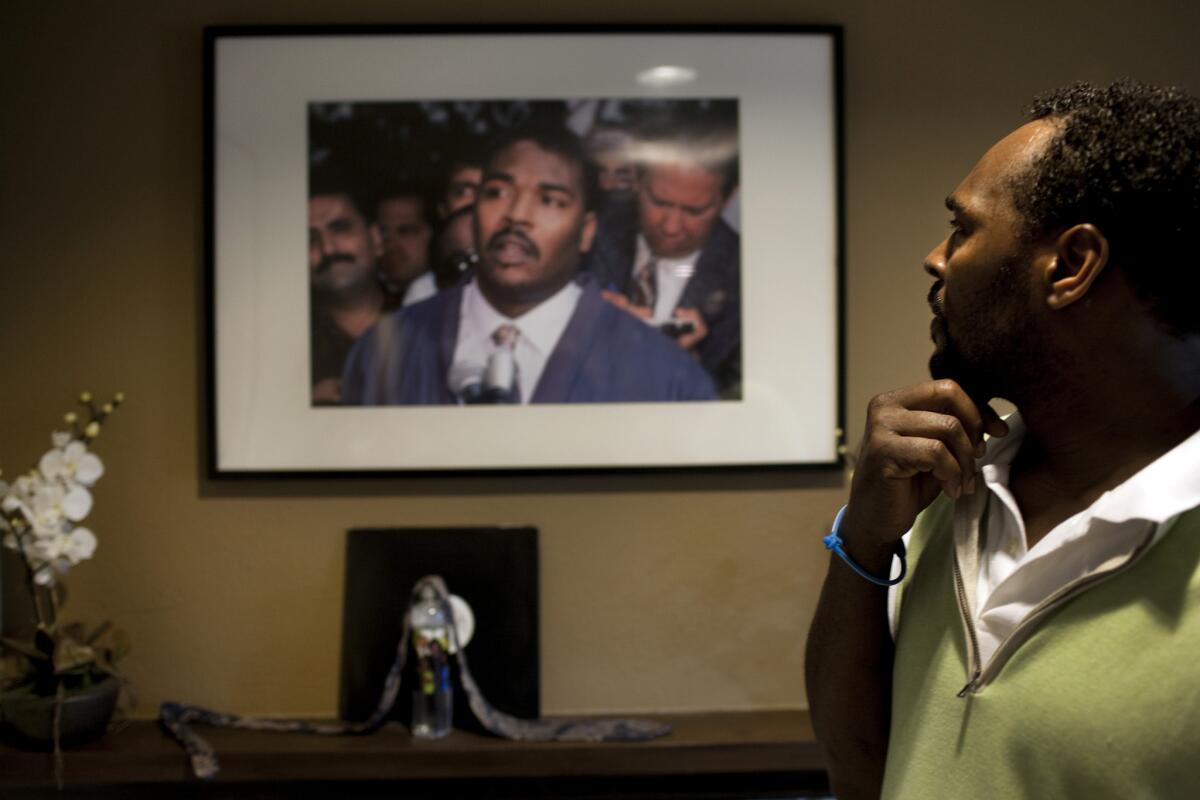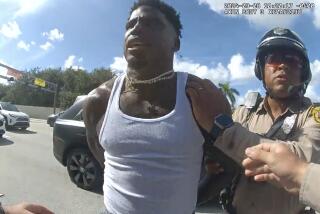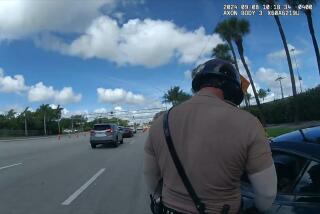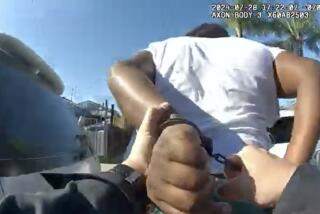From the Archives: Rodney King says he obeyed police

Rodney King looks at a picture of himself from May 1, 1992, the third day of the Los Angeles riots, which hangs in the living room of his home in Rialto, in 2012. At that press conference, King uttered the famous words, “Can we all get along?”
- Share via
Rodney Glen King, his face battered and one eye swollen half-shut, gave his version Wednesday of a beating he took at the hands of Los Angeles police officers, insisting he obeyed their commands and did nothing to provoke their ferocious attack.
“I was scared, I was scared for my life. So I laid down real calmly and took it like a man,” King, clad in a blue hospital smock, said from a wheelchair at County Jail hours before his release Wednesday night, more than three days after the attack.
A 25-year-old unemployed construction worker, King was freed after the district attorney’s office announced there was not enough evidence to file criminal charges at this time.
Meanwhile, eyewitnesses continued to come forward with testimony that flatly contradicts what the officers involved contend was an effort to arrest a man who was combative and attempting to escape.
King was wheeled out of the Men’s Central Jail severely bruised and in a leg cast, but waving and smiling to a crowd of reporters at 8 p.m. He had been in custody since shortly after the Sunday morning incident that was captured by an amateur photographer on videotape and subsequently sparked public outrage over the tactics of the Los Angeles Police Department.
Mayor Tom Bradley on Wednesday, in unusually strong terms, vowed that “justice will be meted out to those who deserve punishment.” And he called for a broad investigation into what he termed a disturbing pattern of local police abuse, particularly against minorities.
“I am as shocked and as outraged as anyone,” the mayor, himself a former police officer, said at a news conference. “This is something which we cannot and will not tolerate. . . .
“I assure you that every appropriate action will be taken by the Police Department and the Police Commission.”
The mayor alluded to the alleged harassment of former professional athletes Joe Morgan, who recently won a $540,000 jury verdict against the city for the actions of an LAPD narcotics officer, and Jamaal Wilkes. The department has also been roundly criticized for its handling of the so-called 39th and Dalton case, in which four officers allegedly helped destroy property in several apartments.
The mayor said several officers who took part in King’s beating have been relieved from field duty pending investigation of what appears to be a fierce attack of kicking, clubbing and shots from a stun gun delivered to a man who was lying on the ground, seemingly defenseless.
The Police Department, besieged by public criticism, shut down the release of any information about the attack and declined to say how many officers were put on restricted duty, or even how many were involved.
The videotape revealed that as many as a dozen officers surrounded King and at least three took part in the clubbing, while others stood by and watched.
“They are now working either at a desk or are on vacation,” Bradley said of the officers. “They are on other assignments. They are not going to be working the streets and dealing with the public.”
Police Chief Daryl F. Gates has ordered an expedited departmental investigation of the beating, which has fallen under intense criticism as the stunning tape continues to be played over and over by television networks across the country.
The mayor’s office and the American Civil Liberties Union have been swamped with calls from people revolted by what they saw.
The Police Department contends that King was resisting arrest after a car chase they say hit speeds of up to 115 m.p.h. But prosecutors say police, so far, have failed to prove their case.
The officers who clubbed and kicked King on Sunday failed to interview available witnesses--including two passengers in King’s car--or to conduct a thorough investigation to support their claims that King was combative and evading them, the district attorney’s office said.
“We have sent the case back (to police) for further investigation,” Deputy Dist. Atty. Don Eastman said. “There are a lot of things we want to look at and a lot of witnesses who were not interviewed.”
Prosecutors did not rule out charges being filed against King in the future, alleging that he may have been drunk at the time. No chemical tests were conducted after his arrest because he was in need of immediate medical attention for his injuries, including severe bruises, blows that disfigured one side of his face and, according to his wife, a broken leg.
“It is not a rejection (of the case) forever, or an indication that we are going to file,” said Roger Gunson, head of the district attorney’s Special Investigations Division.
Meanwhile, accounts from the California Highway Patrol suggested that what should have been a relatively simple arrest at 12:30 a.m. Sunday morning escalated wildly out of control.
The pursuit of King’s white 1988 Hyundai was initiated by CHP officers, who estimated that King’s car was hitting speeds as high as 115 m.p.h. on the westbound Foothill Freeway. The CHP said they called for assistance and had pulled King over in Lake View Terrace in the San Fernando Valley when several LAPD officers “jumped into the mess,” said a law enforcement source familiar with the report CHP officers filed with their supervisors.
When the sedan finally stopped in the 11700 block of Foothill Boulevard, King was ordered out of the car via a loudspeaker and he “appeared to be acting funny, but not violent--laughing and pointing up to the LAPD helicopter that was there.”
The source said that a police sergeant told the CHP that his officers would handle things. Witnesses said King was already lying on the ground when a police officer shot him with a stun gun, delivering an electrical shock of 50,000 volts. Officers then clubbed him wildly. There was a brief lull and King lay silent until one officer stomped on his head.
One of the CHP officers at the scene exhorted the police officers to stop the beating but was told, in effect, to “stay out of it,” according to the source.
“Basically, they beat the guy half to death,” the source said.
King was later hogtied, with handcuffs around his wrists and ankles, then taken away in an ambulance.
As King talked about the beating Wednesday, his speech was slurred and repetitive. He seemed dazed. And his account of what led to the attack differed considerably from that offered by police.
“There was no chase,” King contended, insisting that he was doing 45 m.p.h. in a 35-m.p.h. zone.
After he pulled his car to a stop, King said he was told to put his hands in full view and that he complied. Police told him to get out of the car and lie down, and King said he did.
They shocked me . . . they paused for a minute and then they struck me across the face real hard with a billy club.
— Rodney King
“They shocked me . . . they paused for a minute and then they struck me across the face real hard with a billy club,” King said, his face lopsided with swelling and a fresh scar on his right cheek. He lifted his hospital garb to show other marks, a large bruise on his chest, a fading one on his arm, part of his right leg in a cast.
“My ankles. They beat where it hurt in my ankles, they beat my whole body where it hurt. . . . It hurts real bad.”
King, who stands 6-foot-3 and weighs 225 pounds, said he did not resist police.
“No, no, no. I wouldn’t strike back,” King said. “I don’t think no one would strike back against four or five guns aimed at him.”
King’s attorney, Robert Rentzer, said some of King’s teeth were knocked out. A doctor who treated him said King took at least 20 stitches, five of them in the mouth, and had so many cuts that he required antibiotics to prevent infection.
“He looked like he was run over by a freight train,” Rentzer remarked. “He is in pain and has some problems with his memory. The word terrible doesn’t describe how he looks.”
The investigation into the alleged police brutality moved steadily forward Wednesday.
John R. Dunne, assistant U.S. attorney general for civil rights, said the Justice Department is conducting a parallel inquiry to ensure that local authorities do a proper job.
The violent images of white police officers pounding an apparently defenseless black man have raised the ire of civil rights groups from the ACLU to the National Assn. for the Advancement of Colored People, and has brought one more embarrassing controversy to a Police Department recently saddled with plenty.
Former Laker Jamaal Wilkes alleges the LAPD detained him because of the color of his skin last December when he was pulled over and handcuffed by two officers.
Disclosure of Wilkes’ complaint came on the heels of the federal jury award of $540,000 to former major league baseball player Joe Morgan, who alleged in a lawsuit that he was illegally detained and roughed up in 1988 by a Los Angeles police officer who had mistaken the Hall of Famer for a drug runner. Morgan was grabbed by the neck at Los Angeles International Airport, thrown to the floor and handcuffed before a crowd of onlookers.
In recent months, Bradley has moved to strengthen the civilian Police Commission that oversees the department, but lost two veteran members through resignations this week.
While Gates called the beating an aberration, Bradley said it points to a breakdown in leadership that begins with the chief himself.
“The supervision does, in fact, flow from the top of the department down--through his orders and instructions, through his training,” the mayor said. “All of that is connected. We want to see where there was a breakdown, a departure from established orders and procedures in this case.”
Neither Gates nor any other police official would comment on the King case, pending the outcome of the department’s internal investigation.
Police contend King fought their attempts to restrain them. But the videotape made by amateur photographer George Holliday from the second-floor balcony of his nearby apartment--along with more than a dozen eyewitness accounts--have called into question the police officers’ version.
Josie Morales, who was asleep in her apartment when she heard Sunday night’s commotion, said about 10 police officers formed an irregular circle around the prone King. She said she saw an officer shoot him with the stun gun and then begin clubbing him. King tried to get up when two more officers struck him with batons.
“He didn’t touch anybody. He got up and ran blindly, but not running at anyone, just trying to get away,” Morales said. “We thought maybe they’d stopped him for guns or drugs or even murder. . . . There was nothing that the guy did that could warrant that kind of beating. . . .”
King, 25, from Altadena, has been working as a maintenance man at Dodger Stadium but was to start a construction job on Monday, the day after the incident with police.
He was released from prison in December after serving a year for second-degree robbery. A parole supervisor speculated that he might not have stopped because he feared a speeding ticket would jeopardize his parole. But King said he pulled over as soon as he saw the red lights.
“I may have been speeding just a little bit,” he said Wednesday.
King’s attorneys said they were preparing to file a civil rights suit against the LAPD.
“But for the tape I’m not sure justice would have been done,” Rentzer said. “We don’t know what the full extent of Mr. King’s injuries are . . . it could be worth millions of dollars.”
But King’s family emphasized through their lawyers that their case would not be about racism.
“They are not looking to turn this into a racial crusade,” Rentzer said. “His rights were totally violated (but) it’s his rights, not the rights of a race or creed or a religion that’s at issue here. It’s the rights of a human being.”
Times staff writers Leslie Berger, Richard Lee Colvin, Ashley Dunn, Nieson Himmel, Carl Ingram, Ronald J. Ostrow, Sheryl Stolberg and Lois Timnick contributed to this story.
More to Read
Sign up for Essential California
The most important California stories and recommendations in your inbox every morning.
You may occasionally receive promotional content from the Los Angeles Times.










